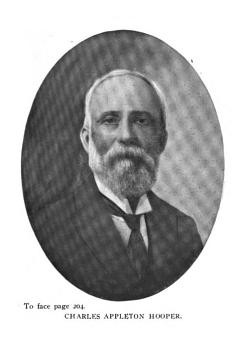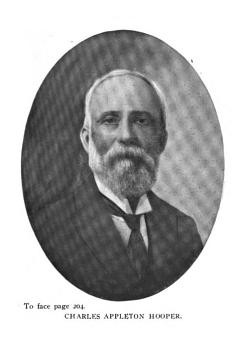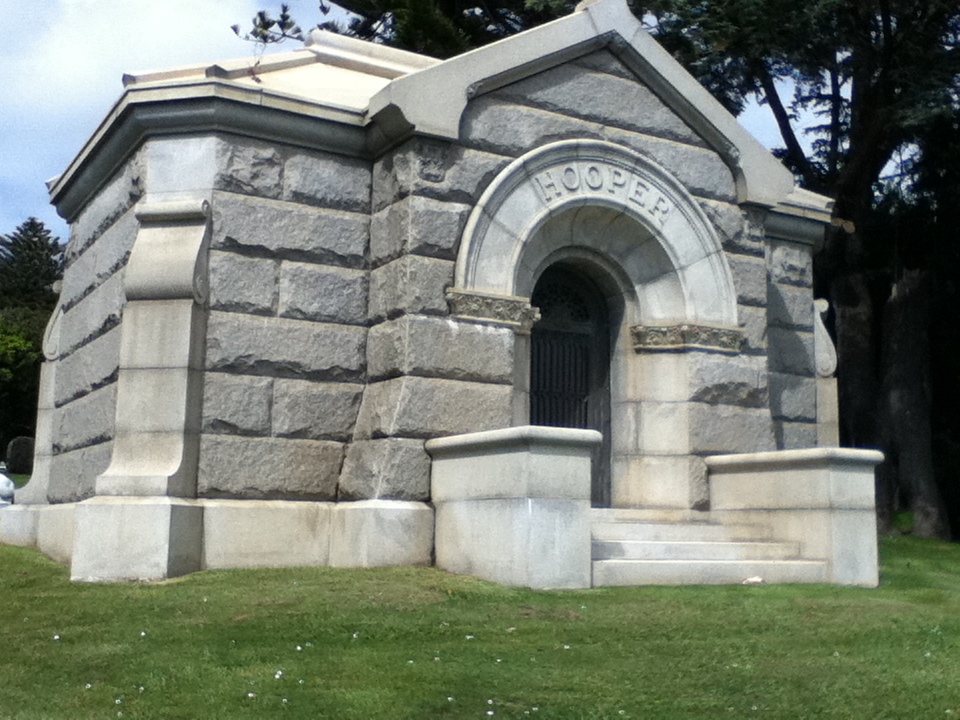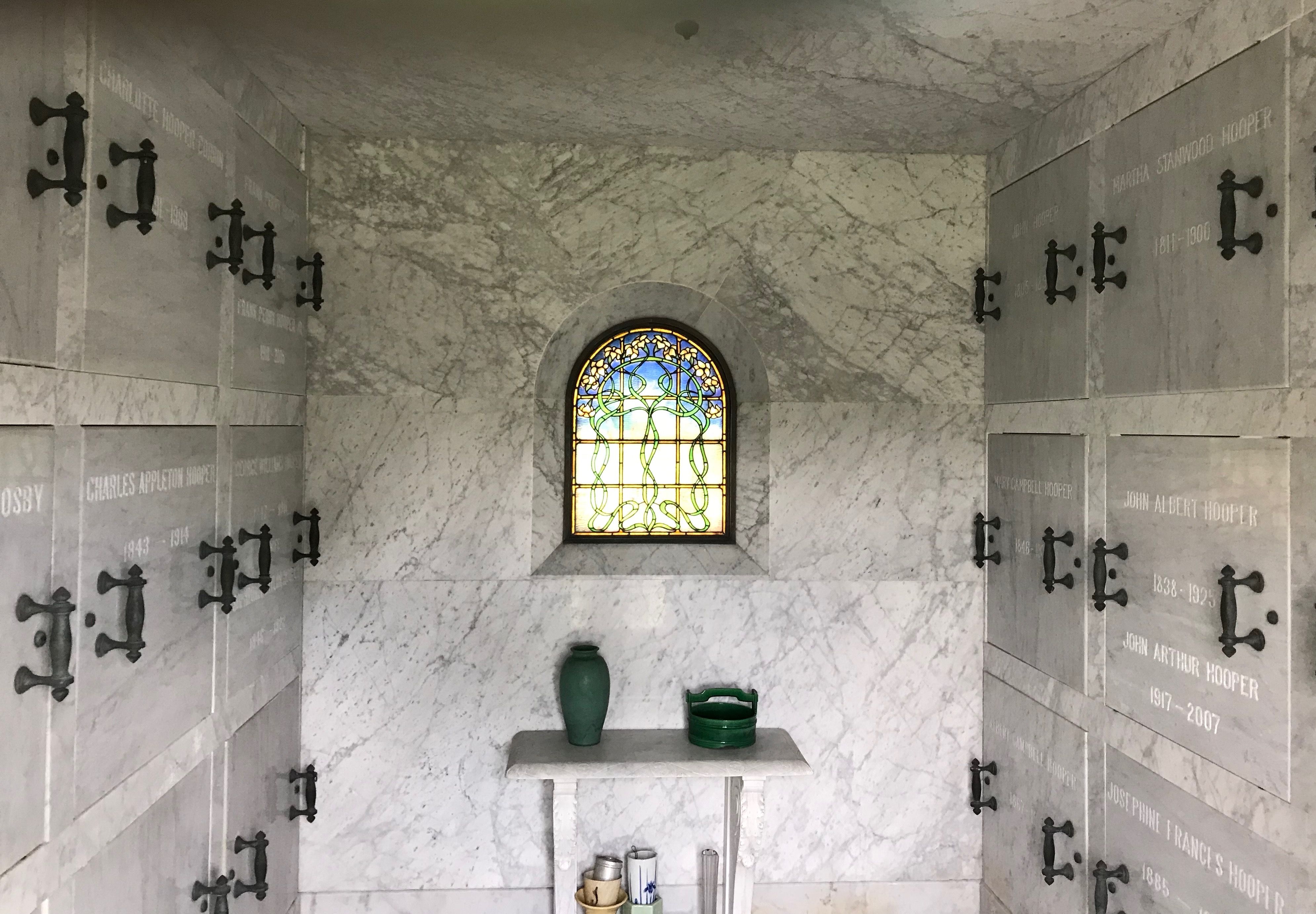Biography from: - "History Of Contra Costa County California With Biographical Sketches Of The Leading Men And Women Of The County Who Have Been Identified With Its Growth And Development From The Early Days To The Present"; Historic Record Company, Los Angeles, California, 1926.
In the early pioneer days of San Francisco, Charles Appleton Hooper and his family were in the business of mining, lumber, shipping, banking, and real estate.
On July 12, 1914, at his home in Pittsburg, California, Charles Appleton Hooper passed away at the age of seventy-one years. He was one of the really great business men of California, and it is almost impossible adequately to write the story of his life without writing the history of the many industries with which he was connected, which space here forbids.
Mr. Hooper came from sturdy New England stock, members of the family having participated in the Revolutionary War. He was born at Bangor, Maine, on March 14, 1843, and was graduated from the Hawes Grammar School in 1858, in South Boston, Mass., after which he attended the English High School for a short time. Upon leaving school he at once entered the employ of his uncle, William S. Perry, a lumber merchant, as a clerk and in two years rose to the position of bookkeeper and salesman, and then to active superintendent of the yard.
At this time the Civil War swept over the country and young Hooper resigned his position to enlist, at the age of nineteen, in the 43rd Massachusetts Volunteers. After one year he received an honorable discharge, in 1863, and then decided to try his fortunes on the Pacific Coast, with his destination Amador County, whither his father, John Hooper, had migrated in 1851 and founded the town of Plymouth. Upon arriving there he worked at mining for his father in the Plymouth Mine one year.
Thinking that mining was not his forte, Mr. Hooper then went to San Francisco and established the firm of C. A. Hooper & Company at Fourth and Townsend Streets, and for several years did a thriving business in supplying lumber to the city and country districts around San Jose, and up the rivers tributary to San Francisco Bay. In 1867 he took as a partner William Lockerman, under the firm name of Hooper & Lockerman, but at the end of two years bought Lockerman's interest and resumed the old firm name. In 1869 George William Hooper, his brother, became a member of the firm, which had become enlarged into a wholesale, retail, and manufacturing business.
Mr. Hooper organized several lumber companies and invested heavily in California ranch lands and timber tracts, thus showing the firm faith he had in the future of this great State. He can justly be called one of the lumber kings of this northwest territory. Among the early companies he organized were the Sacramento Lumber Company, of which he was president. In 1881 he organized the L. W. Blinn Lumber Company at Los Angeles, for the Arizona business, and headed that company also. Then came the Southern California Lumber Company at Los Angeles and the Russ Lumber and Mill Company at San Diego. He was also the founder of the California Lumber Company and the Redwood Manufacturers Company; and in 1907, of the Big Lagoon Lumber Company of Humboldt County. This latter he sold one year later for more than $4,000,000.
When the Bank of California foreclosed, C. A. Hooper became the owner of some 8500 acres of the Los Medanos Rancho; and subsequently he purchased additional holdings until he owned about 11,000 acres, all told, in this locality. Through his experience in California he was able to foresee the possibilities of this place as the site of a thriving industrial city. Mr. Hooper maintained upon the site of the old Stevenson place a large and comfortable residence which he made his country home. He was liberal and donated sites for churches, parks, etc., and in time the town grew to considerable proportions and was given the name of Pittsburg, which it now bears.
In 1903 he founded the Redwood Manufacturers Company, one of the largest enterprises of its kind in the West. The plant now covers 100 acres of land and employs from 600 to 700 persons in the manufacturing of doors, sash, frames, interior and exterior finish, cabinet work, tanks, water pipes, etc. It makes a specialty of using redwood, although it handles great quantities of pine and hardwood, shipping its products to all parts of the world.
He was the means of establishing the Columbia Steel Corporation here, and also the Bowers Rubber Works, now the Pioneer Rubber Works, the Diamond Milling Company, the Pioneer Dairy, and other industrial concerns. In most of these organizations he was personally active and helpful, especially in capitalizing them. How well he succeeded can be seen from the fact that in 1925 said industrial concerns have a total capitalization of more than $30,000,000, with an annual payroll of $4,500,000 and with some 4000 people employed.
On June 7, 1880, at Greenville, Maine, Mr. Hooper was united in marriage with Miss Ida Geneva Snow. They had two daughters, Mrs. Wigginton E. Creed, of Piedmont, and Mrs. Idalene H. Hale, of San Diego. The death of C. A. Hooper marked the passing of one of the most influential citizens of Contra Costa County. Every line of activity had felt the impetus of his large endeavors, notable among which is the C. A. Hooper Company, which has done much to foster the development of homebuilding in this thriving industrial city — a city that will always stand as a monument to his far-seeing vision and constructive enterprise.
Biography from: - "History Of Contra Costa County California With Biographical Sketches Of The Leading Men And Women Of The County Who Have Been Identified With Its Growth And Development From The Early Days To The Present"; Historic Record Company, Los Angeles, California, 1926.
In the early pioneer days of San Francisco, Charles Appleton Hooper and his family were in the business of mining, lumber, shipping, banking, and real estate.
On July 12, 1914, at his home in Pittsburg, California, Charles Appleton Hooper passed away at the age of seventy-one years. He was one of the really great business men of California, and it is almost impossible adequately to write the story of his life without writing the history of the many industries with which he was connected, which space here forbids.
Mr. Hooper came from sturdy New England stock, members of the family having participated in the Revolutionary War. He was born at Bangor, Maine, on March 14, 1843, and was graduated from the Hawes Grammar School in 1858, in South Boston, Mass., after which he attended the English High School for a short time. Upon leaving school he at once entered the employ of his uncle, William S. Perry, a lumber merchant, as a clerk and in two years rose to the position of bookkeeper and salesman, and then to active superintendent of the yard.
At this time the Civil War swept over the country and young Hooper resigned his position to enlist, at the age of nineteen, in the 43rd Massachusetts Volunteers. After one year he received an honorable discharge, in 1863, and then decided to try his fortunes on the Pacific Coast, with his destination Amador County, whither his father, John Hooper, had migrated in 1851 and founded the town of Plymouth. Upon arriving there he worked at mining for his father in the Plymouth Mine one year.
Thinking that mining was not his forte, Mr. Hooper then went to San Francisco and established the firm of C. A. Hooper & Company at Fourth and Townsend Streets, and for several years did a thriving business in supplying lumber to the city and country districts around San Jose, and up the rivers tributary to San Francisco Bay. In 1867 he took as a partner William Lockerman, under the firm name of Hooper & Lockerman, but at the end of two years bought Lockerman's interest and resumed the old firm name. In 1869 George William Hooper, his brother, became a member of the firm, which had become enlarged into a wholesale, retail, and manufacturing business.
Mr. Hooper organized several lumber companies and invested heavily in California ranch lands and timber tracts, thus showing the firm faith he had in the future of this great State. He can justly be called one of the lumber kings of this northwest territory. Among the early companies he organized were the Sacramento Lumber Company, of which he was president. In 1881 he organized the L. W. Blinn Lumber Company at Los Angeles, for the Arizona business, and headed that company also. Then came the Southern California Lumber Company at Los Angeles and the Russ Lumber and Mill Company at San Diego. He was also the founder of the California Lumber Company and the Redwood Manufacturers Company; and in 1907, of the Big Lagoon Lumber Company of Humboldt County. This latter he sold one year later for more than $4,000,000.
When the Bank of California foreclosed, C. A. Hooper became the owner of some 8500 acres of the Los Medanos Rancho; and subsequently he purchased additional holdings until he owned about 11,000 acres, all told, in this locality. Through his experience in California he was able to foresee the possibilities of this place as the site of a thriving industrial city. Mr. Hooper maintained upon the site of the old Stevenson place a large and comfortable residence which he made his country home. He was liberal and donated sites for churches, parks, etc., and in time the town grew to considerable proportions and was given the name of Pittsburg, which it now bears.
In 1903 he founded the Redwood Manufacturers Company, one of the largest enterprises of its kind in the West. The plant now covers 100 acres of land and employs from 600 to 700 persons in the manufacturing of doors, sash, frames, interior and exterior finish, cabinet work, tanks, water pipes, etc. It makes a specialty of using redwood, although it handles great quantities of pine and hardwood, shipping its products to all parts of the world.
He was the means of establishing the Columbia Steel Corporation here, and also the Bowers Rubber Works, now the Pioneer Rubber Works, the Diamond Milling Company, the Pioneer Dairy, and other industrial concerns. In most of these organizations he was personally active and helpful, especially in capitalizing them. How well he succeeded can be seen from the fact that in 1925 said industrial concerns have a total capitalization of more than $30,000,000, with an annual payroll of $4,500,000 and with some 4000 people employed.
On June 7, 1880, at Greenville, Maine, Mr. Hooper was united in marriage with Miss Ida Geneva Snow. They had two daughters, Mrs. Wigginton E. Creed, of Piedmont, and Mrs. Idalene H. Hale, of San Diego. The death of C. A. Hooper marked the passing of one of the most influential citizens of Contra Costa County. Every line of activity had felt the impetus of his large endeavors, notable among which is the C. A. Hooper Company, which has done much to foster the development of homebuilding in this thriving industrial city — a city that will always stand as a monument to his far-seeing vision and constructive enterprise.
Inscription
HOOPER
Gravesite Details
Buried with his father and Hooper family in the Hooper Monument Vault at Cypress Lawn Memorial Park, Colma, San Mateo, California
Family Members
Sponsored by Ancestry
Advertisement
Explore more
Sponsored by Ancestry
Advertisement














